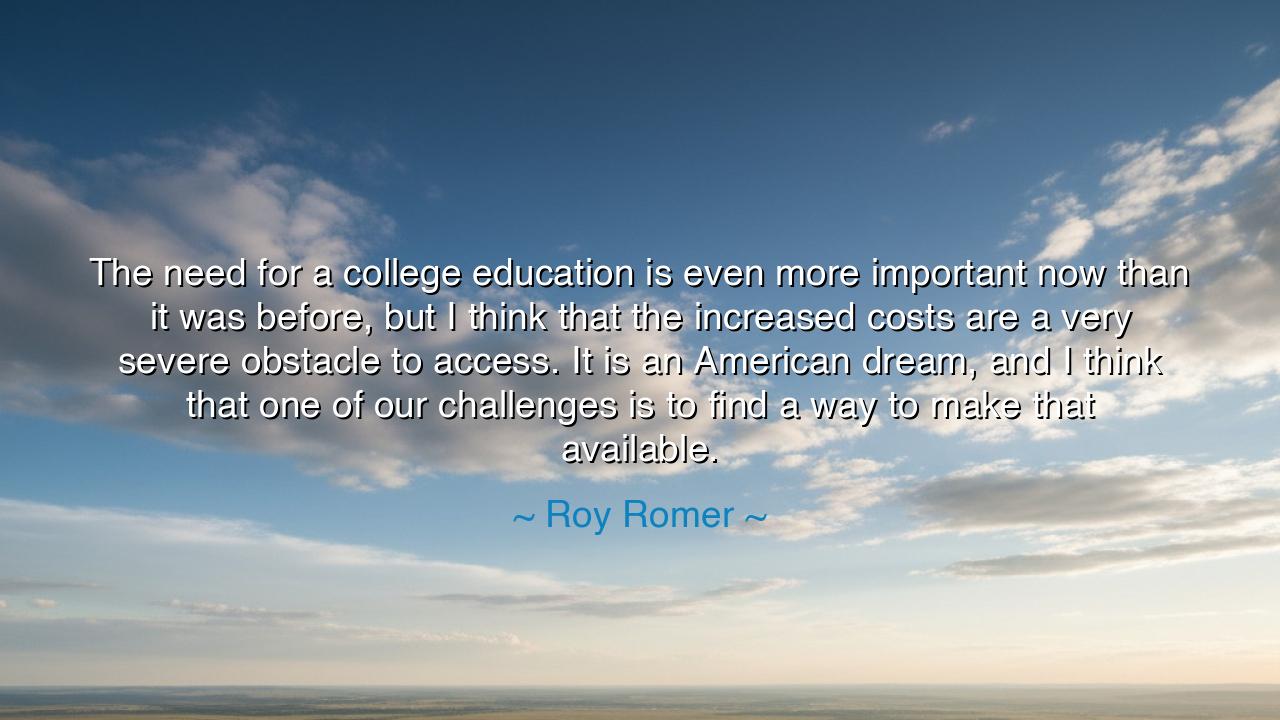
The need for a college education is even more important now than
The need for a college education is even more important now than it was before, but I think that the increased costs are a very severe obstacle to access. It is an American dream, and I think that one of our challenges is to find a way to make that available.






In the words of Roy Romer: “The need for a college education is even more important now than it was before, but I think that the increased costs are a very severe obstacle to access. It is an American dream, and I think that one of our challenges is to find a way to make that available.” These words speak not only of policy, but of destiny. For in them lies the recognition that education is the ladder by which the humble may ascend, the bridge by which the poor may cross into opportunity, the light by which the darkness of ignorance is dispelled. Yet Romer also warns us that this ladder, this bridge, this light, is too often hidden behind the walls of wealth, leaving countless seekers stranded in shadow.
The ancients too understood this truth. Plato wrote that the soul, like a prisoner in a cave, must be led out into the light of truth through education. He taught that without learning, men stumble in ignorance, mistaking shadows for reality. But he also declared that education must not be reserved for the elite alone, for the health of the city depends on the wisdom of all its guardians. In the same way, Romer’s words remind us that the American dream is threatened when education becomes a privilege of the few, rather than a right of the many.
Consider the story of Abraham Lincoln. Born in poverty, he had no access to great schools or universities. By the flicker of firelight, with borrowed books and scraps of paper, he taught himself the knowledge of law and government. His rise from obscurity to the presidency embodies the promise of the American dream: that through learning, character, and perseverance, one may transcend circumstance. But in Lincoln’s time, the scarcity of institutions made his path extraordinary. In our age, Romer reminds us, the institutions are plentiful—but the costs of access deny many the chance to walk the path at all.
History also shows us the peril of denying learning to the masses. In medieval Europe, knowledge was hoarded by the few, chained in monasteries, written in tongues that common people could not read. Power remained concentrated, and progress stagnated. Only with the Renaissance, when books spread and learning became more accessible, did humanity’s potential blossom anew. So too today: when the gates of education are barred by costs, society risks falling into stagnation, and the dream of advancement becomes a mirage for the many.
Yet Romer does not despair. He calls this a challenge, not a curse. Challenges are meant to be overcome. Just as past generations built schools, libraries, and public universities, so must our generation find new ways to open the gates of learning. For if the American dream is to endure, it must rest not on wealth or inheritance, but on the ability of every child to climb as high as their spirit will carry them. To deny this is to betray the very ideals upon which the nation was founded.
The lesson is clear: if you wish to strengthen your people, strengthen their education. If you wish to honor your nation, make its opportunities accessible. And if you love justice, fight the obstacles that bar others from learning. For the dream of America is not merely to prosper, but to prosper together, each generation lifting the next by ensuring that knowledge is not a fortress for the few, but a wellspring for the many.
Therefore, O listener, engrave this wisdom on your heart: cherish education as the truest wealth, guard it as the noblest inheritance, and labor to extend it to all. Do not rest while others are denied the chance to learn. For as Romer declares, the American dream cannot survive if it is not shared. And only when the gates of knowledge are open wide will the nation fulfill its highest calling: a land where every soul, through learning, may rise.






AAdministratorAdministrator
Welcome, honored guests. Please leave a comment, we will respond soon